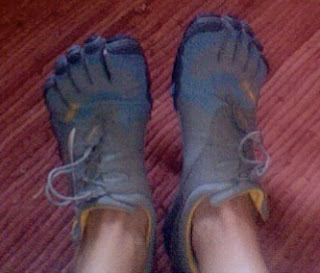(The next time someone laments to you of the "water weight" they've gained, perhaps you can snicker and inquire if they are now 65% water?)
Here is the question: If our bodies are comprised of so much water, why is it we need to drink so much water? Is it for our health alone? How much do we need to drink? Do you drink when you're thirsty, or because you know your body requires hydration?
For a concept as simple as drinking water, there are so many opinions out there.
The old adage is that we need EIGHT - 8 ounce glasses of water.
Let's examine that, because we also receive water intake from our food. Yes, our food. The higher fruit and vegetable intake in the foods we eat means we take in far more water. Some experts think that 20% of your total fluid intake is from fruits and vegetables. You do eat fruits and vegetables, right? (Ahem...)
For those who eat grains and sugar, the body requires MORE water. Why? The grains and sugars (typically found in processed foods) need to "move" through your system, and to do that, they need water.
So, the other 80% of water you need? Assuming you are eating enough fruits and vegetables, and taking in 20% of your fluid intake by produce? How do you account for the remainder?
Here are some other questions to consider and ponder: How much extra water do you need if you exercise? Is there a difference in water requirements in a sedentary or active person? Healthy or sick? Old or young? Climate temperatures? Does a person residing in Southern Florida require more water than someone living in the Midwest?
All good in theory and questioning, and definitely worth addressing. There is no SET AMOUNT, in any research, anywhere. Let's start out with some quick tips and facts:
1) First, start out the morning with a glass of water. (What else have you to do while your coffee is brewing?)
2) Set a plan. Here is what what works for me: I set out five 16.9 oz bottles of water on my kitchen counter. As I come and go throughout my day, I grab a bottle to drink as I pass through. Most of the time, I can finish all five bottles - a total of (give or take) 85 ounces of water. The downside: If it's 10pm, and I haven't finished the water (and I'm sleepy and VERY ready for bed, God forbid) I force myself to stay up and finish the last ounce of water. Discipline, huh?
And you know what that means, right? (If I forget to drink my water?) I'm up and about, maneuvering my way to the bathroom in the middle of the night.
If you exercise that day, thirty minutes of more, or work up a big sweat with yardwork, gardening, etc.. - make sure you drink an additional 16 ounces. Helps with muscle and cell hydration for recovery.
3) If it's hot, temperature wise, and you're sweating - more water. As you sweat, all of that needs to be replenished. You can lose anywhere from 5-6 cups of water, per day just from sweating and bowel movements. Interesting, isn't it? So, as I stated above, does the person living in Southern Florida need to drink more fluids than their counterpart in the Midwest? Well, if it's 95 degrees and humid in Florida and you're sweating buckets? Yes.
And in the Midwest, when it is 50 degrees? Your "liquid" requirements aren't as high. So heat and exercise do play a major role.
4) And yes, you knew I was going to bring this up... Oh! Don't be surprised. (Certainly, I'll ask about bowel movements in another blog.) Ready?
How MUCH do you pee? And what color is your urine? If your urine is dark yellow, or even orange - you are NOT drinking enough. Urine should be light (almost clear) and should occur (as an event! Yes, an event!) about every 3 to 4 hours. Vitamins and medications can change the color of your urine, but usually if medications are taken in the morning, the first few urine's are darker in color, and later in the day, it should get clearer and clearer. And yes, medical conditions will affect fluid balance.
5) Every beverage counts. Really, you ask? Yes. Every glass of juice, cup of coffee, cup of milk - it COUNTS. It's liquid. It's consumed. It counts.
Do you know that feeling of THIRST, and you comment,"I need something to drink!" Well, my friend, you're already dehydrated. That is your first clue. Thirst.
Just writing this made me thirsty. Shall we grab a glass of water? Cheers.




